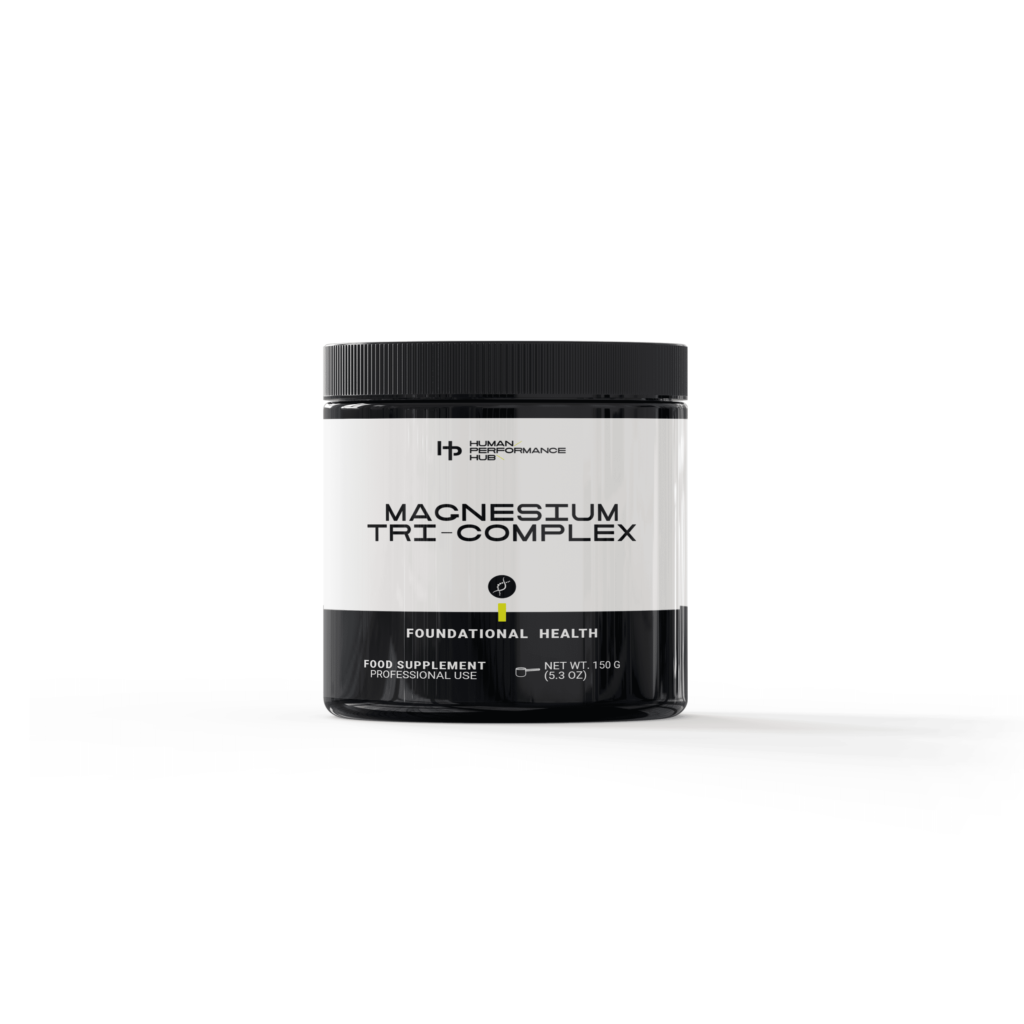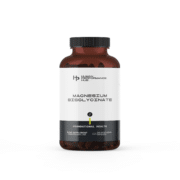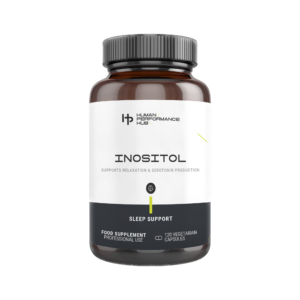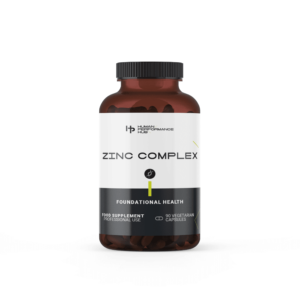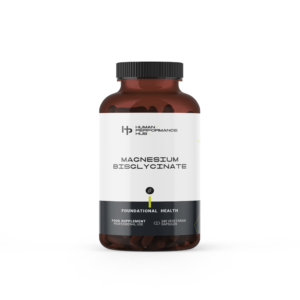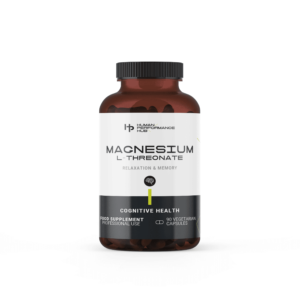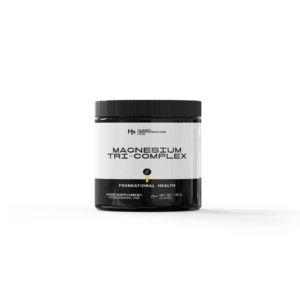Dive into the impressive health perks of magnesium, an indispensable ally for improved sleep quality and effective blood pressure management. Commonly sourced from various foods, this crucial nutrient is conveniently accessible in supplement form. Our specially formulated magnesium powders at Human Performance Hub stand ready to fill any dietary gaps.
We pridefully introduce Magnesium Orotate, Magnesium Glycerophosphate, and TRAACS Magnesium Bisglycinate — supplements expertly crafted to enhance your sleep, regulate blood pressure, and mitigate anxiety and menopausal discomforts.
Magnesium: An Essential Nutrient for Whole-Body Health
Magnesium’s Crucial Functions Within the Body
Magnesium is at the heart of more than 300 essential biochemical processes. This mineral is essential for bone strength and maintaining healthy muscles and cardiac function. It efficiently converts what we consume into usable energy, is pivotal in protein synthesis, and orchestrates intricate communication across the brain and neurological systems. A paucity of magnesium can contribute to muscular dilemmas, heightened anxiety, and an elevated risk of cardiovascular diseases. Adequate magnesium levels are paramount for consistent nerve operations and maintaining a rhythmic heartbeat.
Advantages of Magnesium Supplements
While a well-rounded diet can provide sufficient magnesium, modern agricultural practices may impede the nutrient’s presence in our food sources. Our supplements, such as Magnesium Orotate and others, show their true value here. They are especially beneficial for individuals with dietary magnesium deficits from stress, vigorous activities, or conditions like menopause.
Regular supplement intake helps maintain a consistent level of magnesium, which has been shown to aid sleep improvement, blood pressure control, and mental well-being. Incorporating a magnesium supplement into your daily wellness regimen is a proactive step towards holistic health.
The Comprehensive Health Benefits of Magnesium
Magnesium as a Catalyst for Sleep Improvement
Magnesium is renowned for fostering restful sleep. It pacifies the nervous system while activating mechanisms conducive to relaxation. It modulates melatonin, the hormone responsible for your sleep-wake cycles, and interacts with neurotransmitters that modulate neural activity, thereby reducing stress and anxiety that can often interrupt sleep. Consumers frequently report an enhancement in sleep quality with regular magnesium supplementation. Our TRAACS Magnesium Bisglycinate, taken at bedtime, could be instrumental in achieving profound, restorative sleep.
The Role of Magnesium in Blood Pressure Regulation
Magnesium’s contribution to heart wellness is significant. Research demonstrates that magnesium can dilate blood vessels, effectively reducing elevated blood pressure — a critical factor for those managing hypertension or at risk of heart disease. Supplements containing magnesium are particularly effective in lowering blood pressure in individuals with identified deficiencies or diagnosed hypertension. Sustained magnesium consumption has been associated with long-term blood pressure stabilisation, contributing to overall heart health. As with any dietary supplement, consult a healthcare provider before starting a magnesium regimen, particularly if you have preexisting health conditions.
Magnesium’s Efficacy in Anxiety Reduction
Through its sedative effects on the nervous system, magnesium plays a key role in mitigating feelings of anxiety. It helps diminish stress-signalling hormones and bolsters the brain’s capacity to respond to stress. It may also balance mood-influencing neurotransmitters, thus facilitating a soothing effect. Magnesium is commonly recommended for anxiety relief. However, it is advisable to include magnesium as a component of a multifaceted approach to managing anxiety.
Selecting the Optimum Magnesium Supplement
Magnesium Orotate 100 mg for Fundamental Health Requirements
Choosing an appropriate magnesium supplement in terms of type and dosage is vital. We often suggest starting with Magnesium Orotate 100 mg for its superior bioavailability. Beneficial for cardiovascular robustness and enhancing athletic performance through its role in producing energy, it provides an excellent introductory dosage, which a healthcare professional can fine-tune.
Praise for Absorption: Magnesium Glycerophosphate 100 mg
Our magnesium glycerophosphate 100 mg is distinguished by its exceptional absorption capabilities. Coupled with glycerophosphate, it ensures optimal uptake, offering your body more of the mineral’s benefits even in smaller doses. Known for its gentle action on the digestive system, it’s an excellent choice for addressing muscle cramps and general fatigue.
The Bioavailability Conqueror: TRAACS Magnesium Bisglycinate
Enhanced bioavailability is the hallmark of our chelated TRAACS Magnesium Bisglycinate, resulting in superior absorption without gastrointestinal discomfort. This magnesium type stands out due to TRAACS—a patented system guaranteeing the body’s maximum magnesium uptake.
Personalised Benefits: Magnesium for Specific Health Conditions
Managing Menopause with Magnesium
For managing the symptoms of menopause, such as hot flashes and mood fluctuations, magnesium proves invaluable. It contributes to hormonal equilibrium and serves as a natural tranquilliser. Supporting critical areas such as bone and heart health, magnesium is especially important during the menopausal transition.
Identifying the Best Magnesium Supplement for Your Needs
Selecting the most suitable magnesium supplement is a decision best tailored to your unique health requirements and aspirations. A healthcare provider’s counsel is the optimal route for individualised recommendations. Human Performance Hub offers a spectrum of high-quality magnesium formulations to align with your wellness objectives. You can find insightful guidance on choosing magnesium supplements on our blogs and search function.
Your Trusted Resource for Magnesium: Human Performance Hub
Premium-Quality Magnesium Supplements You Can Depend On
Our commitment to delivering magnesium supplements of the highest calibre is unwavering, and each batch is stringently tested for purity and efficacy. You select a dependable source for premium-grade magnesium supplements by choosing Human Performance Hub.
Your Collaborative Ally for Enhanced Health
Human Performance Hub is a supplier and your collaborative ally in pursuing optimal health. Our well-versed team stands ready to guide you to the magnesium supplement that perfectly supports your health objectives. With our expert assistance, you can start your wellness journey. Our website is a treasure trove of knowledge on the importance of magnesium in sustaining peak health.
Explore our comprehensive magnesium supplement range and embrace a healthier lifestyle under the expert guidance of Human Performance Hub.
FAQs About Magnesium
-
What are magnesium’s key health benefits? Magnesium contributes to various health benefits, including sleep enhancement, blood pressure regulation, muscle and cardiac function, energy production, nerve operations, and mood balance. It also plays a crucial role in mitigating symptoms of menopause and anxiety.
-
How do magnesium supplements improve sleep quality? Magnesium has calming effects on the nervous system and aids in sleep induction by adjusting melatonin, the hormone responsible for regulating sleep-wake cycles. Moreover, it interacts with neurotransmitters that influence neural activity, helping to reduce stress and anxiety that can disrupt sleep.
-
What is magnesium’s role in blood pressure control? Magnesium consumption has been linked to dilation of blood vessels, effectively lowering high blood pressure—critical for those living with hypertension or at risk for heart disease. Regular magnesium intake helps stabilise blood pressure over time, contributing to overall cardiovascular health.
-
Which magnesium supplement should I choose? Your choice depends on your unique health needs and goals. If you’re a beginner, Magnesium Orotate 100 mg can be an excellent starting point. Magnesium Glycerophosphate 100 mg is known for its optimal absorption capabilities, and TRAACS Magnesium Bisglycinate offers superior absorption without causing gastrointestinal discomfort.
-
How does magnesium help with menopause? Magnesium can help control symptoms of menopause, such as hot flashes and mood swings, as it contributes to hormonal balance and serves as a natural tranquiliser. It’s also important for maintaining bone and heart health during menopause.
Validating Research and Resource Materials
Here are select resources and research studies for those interested in the scientific grounding of magnesium’s health advantages:
-
“The Effects of Magnesium Supplementation on Subjective Anxiety and Stress—A Systematic Review,” an investigation into magnesium’s impact on anxiety levels.
-
“Magnesium in Prevention and Therapy,” an extensive overview of the health benefits associated with magnesium.
-
Our insightful article, “5 Science-Backed Reasons to Take Magnesium,” analyses why magnesium is essential for your health.
-
Our “Magnesium FAQ” page addresses frequently asked questions about magnesium, offering clarity and guidance for your journey with Human Performance Hub.


